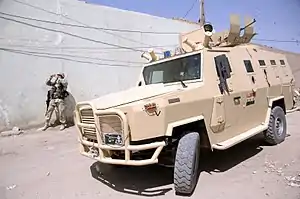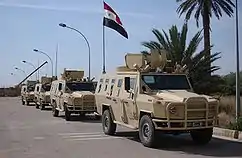| Dzik 3 | |
|---|---|
 Dzik-3 known as Ain Jaria-1 | |
| Type | Infantry mobility vehicle |
| Place of origin | Poland |
| Service history | |
| In service | 2004 - Present |
| Used by | Iraq Poland Lithuania Ukraine |
| Production history | |
| Produced | 2004[1] |
| Specifications | |
| Mass | 4.5 tonnes (4.4 long tons; 5.0 short tons) |
| Length | 5.74 metres (18.8 ft) |
| Width | 2.05 metres (6 ft 9 in) |
| Height | 2.16 metres (7 ft 1 in) |
| Crew | 13 |
| Armor | Mostly B6 class armour; engine B4 armored |
Main armament | PK machine gun using 7.62×51mm NATO |
Secondary armament | As an alternative NSV using 12.7×108mm or 12.7×99mm NATO |
| Engine | Iveco Aifo SOFIM 8140.43N 107 kilowatts (143 hp) |
| Power/weight | 32 horsepower per tonne (24 kW/t) |
| Suspension | SM62 |
Operational range | 800 kilometres (500 mi) |
| Maximum speed | 100 kilometres per hour (62 mph) |
Dzik (Polish: Wild Boar) is a 4.5-tonne (4.4-long-ton; 5.0-short-ton) Polish-made multi-purpose infantry mobility vehicle. Produced by the AMZ works in Kutno, it is designed for serving both the patrol and intervention roles, as well as an armoured personnel carrier for use by various peace-keeping and policing forces. Its armour provides defence against 7.62 mm bullets. The Dzik-3 also boasts bulletproof windows, puncture-proof tires and smoke launchers.
The Dzik cars are powered by a turbodiesel engine that produces 146 hp (107 kW) with a 2,797 cc (170.7 cu in) displacement.
Variants
The Dzik is issued in four variants based on the same chassis:
- Dzik-AT (AT antyterrorystyczny - anti-terrorist) with 3 doors, room for up to 8 people and 10 firing ports.[2]
- Dzik-2 with 5 doors, room for up to 8 people, 8 firing ports and a rotating machine gun turret in the roof.[3]
- Dzik-3 (also known by the Iraqi designation Ain Jaria 1) with 4 doors, room for up to 11 soldiers, 13 firing ports, machine gun turret and two double smoke grenade launchers.[4]
- Dzik Cargo with 2 doors, 2 firing ports, room for up to 3 people and a cargo hold.[5]
Customers can also get Dziks in ambulance and anti-aircraft versions.[6][7]
A number of Dzik-AT cars were bought by the Polish Ministerstwo Spraw Wewnętrznych i Administracji and are to replace obsolete BTR-60 APCs as the basic anti-terrorist vehicle in Polish service. Dzik-2 were used by the Polish Military Police (Żandarmeria Wojskowa), and were also known under a nickname Gucio (a diminutive of Gustav). They were withdrawn from service in 2014.[8]
The Dzik-3 was specifically designed to fit the needs of the New Iraqi Army, where it is adopted as the basic armoured personnel carrier. As of 2006, 600 Dzik-3 were ordered, with an option to extend the order to 1,000 or more.
Operators

Current operators
Gallery
 Dzik-2 in the colours of the Żandarmeria Wojskowa
Dzik-2 in the colours of the Żandarmeria Wojskowa Iraqi Dzik-3s
Iraqi Dzik-3s Firing ports of the Dzik-3
Firing ports of the Dzik-3
See also
References
- ↑ AMZ-KUTNO Ltd Military production. Archived January 3, 2008, at the Wayback Machine Retrieved on January 11, 2008.
- ↑ "Archived copy". Archived from the original on 2007-09-27. Retrieved 2007-02-03.
{{cite web}}: CS1 maint: archived copy as title (link) - ↑ "Archived copy". Archived from the original on 2007-09-27. Retrieved 2007-02-03.
{{cite web}}: CS1 maint: archived copy as title (link) - ↑ "Archived copy". Archived from the original on 2007-09-27. Retrieved 2007-02-03.
{{cite web}}: CS1 maint: archived copy as title (link) - ↑ "Archived copy". Archived from the original on 2007-09-27. Retrieved 2007-02-03.
{{cite web}}: CS1 maint: archived copy as title (link) - ↑ "Image: amz_dzikmed_1.jpg, (800 × 600 px)". September 5, 2006. Archived from the original on January 25, 2007. Retrieved September 5, 2015.
- ↑ "Image: amz_dzikpoprad_1.jpg, (800 × 600 px)". September 5, 2006. Archived from the original on January 26, 2007. Retrieved September 5, 2015.
- ↑ "SILO zamiast PILO".
- ↑ @UAWeapons (May 16, 2022). "🇺🇦 Ukraine Weapons Tracker (@UAWeapons)" (Tweet) – via Twitter.